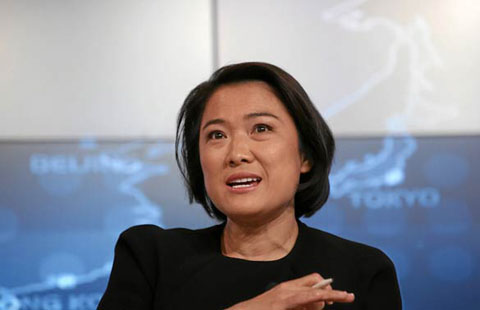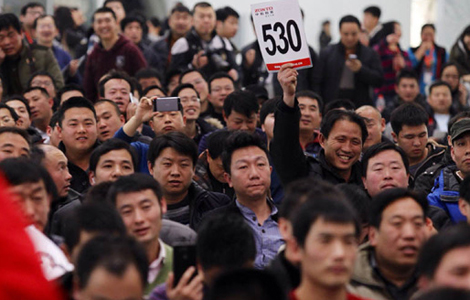Trade between China,Brazil expected to rise
Updated: 2015-01-26 05:13
By BRUNA GAMA in Rio de Janeiro(China Daily Latin America)
|
|||||||||
Brazil-China trade decreased significantly in 2014, with Brazilian exports to China dropping more than 10 percent. And last year Latin America's largest economy registered its first annual trade deficit since 2000, continuing a downward trend started in 2012. In 2015, it is estimated that the country will have a small trade surplus.
Despites all the negatives, Brazilian expert Carlos Tavares de Oliveira, author of nine books on China – the 10th is expected to hit local stores next month – remains optimistic on the future of Brazil's trade, and especially its commerce with China, the country's main trade partner.
Trade with China fell due to special circumstances, namely a decrease in the price of commodities, which make up the bulk of Brazilian exports; however, commodities' prices may rise this year – iron ore prices have already recovered somewhat, Tavares said.
"Trade with China is going well; there was a reduction in the price of commodities, of iron ore, soybeans and especially oil, but China will continue to be Brazil's main trade partner," he said.
In 2015, Tavares believes trade with China may even increase instead of falling, with more manufactured Brazilian products being exported to China.
"There is a chance that the export of manufactured products will increase, so I do not believe in a decrease in the bilateral trade with China, because the international market is having a reaction; the US increased its production and imports and so did the EU, so I, as an observer and analyst, do not believe in a decrease in international trade. It will at least stabilize and even increase slightly," he said.
Tavares named a number of aspects which may help boost bilateral trade in 2015, and commented on the sharp fall in oil prices, which might pose as a problem for Brazil. He retains an optimistic view of the situation, though, stressing that Brazil's pre-salt exploration remains mostly viable even with the price of a barrel of oil having fallen by half.
"This has already been analyzed, and even at a $50 a barrel price, pre-salt exploration is viable," he said.
Tavares believes oil prices may rise this year, as representatives of oil producing countries have already met to decide whether to reduce production to force a price rise. And even if they do not, oil consumption will not fall; on the contrary, it is likely to rise, he said.
In addition, the decrease in oil prices is not completely bad: with the low prices, exploration in some of the more expensive wells becomes unviable, but in the domestic market, the fall in oil prices is good for the people, both Brazilian and Chinese, Tavares said.
"Gasoline prices already fell here, which is good for inflation control, and for consumption in China. So there is a good side to the decrease in oil prices, too," he said.
Another opportunity for Chinese investments in Brazil is developing, he said. Because of the recent bribery and money laundering scandal at Brazil's state-control oil giant Petrobras, many local construction companies reportedly involved in the scheme have been suspended from contracting with Petrobras, forcing the oil giant to seek suppliers abroad.
"A great opportunity will be opened for Chinese companies which are interested and have the money to invest in oil. It will be a good opportunity for Chinese companies to replace some of the local contractors, not only by associating with Petrobras but also by associating with other Brazilian companies. Brazilian companies must understand that Chinese companies are a good partner for pre-salt and regular oil exploration," Tavares stressed, recalling that Brazil's new Mines and Energy Minister Eduardo Braga said that Petrobras will have to focus on new opportunities and other investment options.
Tavares recommended that the BRICS Bank, whose creation was officially approved last year, should become operational as soon as possible to provide a trade boost in the BRICS member countries, which, besides Brazil and China, include Russia, India and South Africa.
Brazilian companies also should pay a lot of attention to the new Shanghai Free Trade Zone, as it poses a great opportunity for them to enter the Chinese market or increase their presence there, he said.
According to Tavares, pharmaceutical and beauty products, all sorts of vegetable-based manufactured products and processed foods could benefit from the FTZ by becoming better known to Chinese consumers.
"Processed foods like corned beef and palm hearts can be sold in China, as the country is a great importer of this sort of products. I think the Shanghai Free Trade Zone is a good initiative and must be explored, so is the BRICS Bank," he said.
Overall, Tavares believes in a better scenario for the year, despite local estimates for low growth and economic difficulties.
"President Dilma Rousseff, with the more recent reforms and having put some market professionals in the finance and planning ministries, will manage to at least maintain trade at its current levels. I am optimistic on the matter of international trade, and especially of the Brazil-China trade," he said.

 Red carpet of 21st annual SAG Awards in Los Angeles
Red carpet of 21st annual SAG Awards in Los Angeles
 Businesswomen shine at the World Economic Forum
Businesswomen shine at the World Economic Forum
 Dogs compete at the Siberean Cup
Dogs compete at the Siberean Cup
 The world in photos: Jan 19-25
The world in photos: Jan 19-25
 Drama with a twist
Drama with a twist
 Auctions of official vehicles starts in Beijing
Auctions of official vehicles starts in Beijing
 Icy challenge in freezing temperatures
Icy challenge in freezing temperatures
 Chinese stars join new reality show 'Wonderful Friends'
Chinese stars join new reality show 'Wonderful Friends'
Most Viewed
Editor's Picks

|

|

|

|

|

|
Today's Top News
Favorable visa policy to draw talent
Chinese tourists rank US No 1 road trip destination
Expert: What Obama's India visit means to China
2 dead after shooting inside Manhattan store
China's signal of innovation in Davos
China's coal industry freezes over
China further lowers threshold to attract overseas talent
China disqualifies 300 intangible cultural heritage programs
US Weekly

|

|








